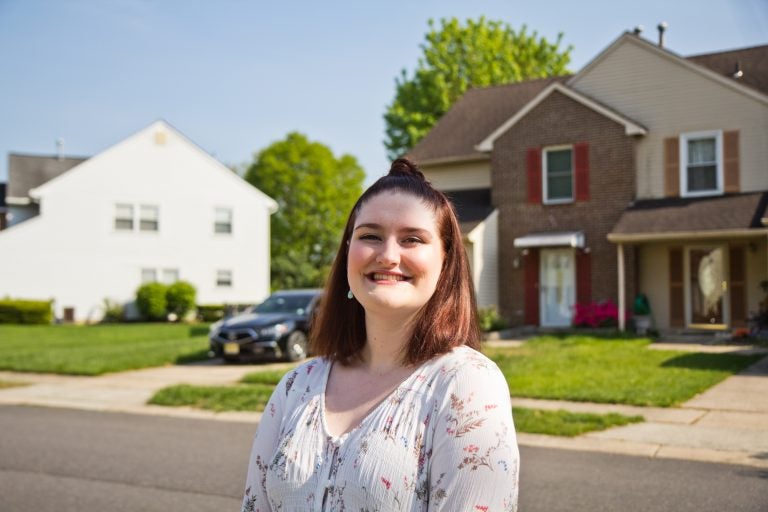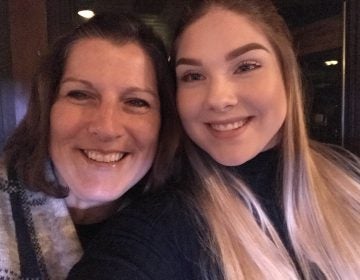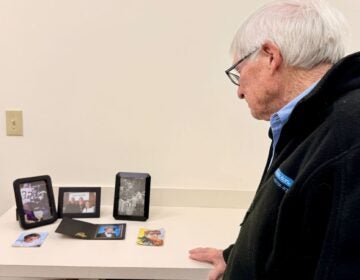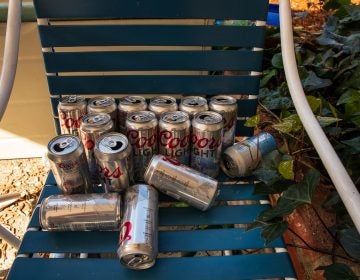Finding emotional support when your sibling has an addiction
The experience of a brother or sister of someone with a drug addiction is distinct from a parent’s. Siblings may feel guilty they didn’t see signs of a substance problem.
Listen 4:55
Natalie, 16, in her neighborhood in Voorhees, N.J. She received support from the Alateen support group. (Kimberly Paynter/WHYY)
This story is part of our Modern Kids series.
Natalie is 16 years old, a sophomore at a performing-arts high school in New Jersey. She keeps track of her life through whatever theater production she was in at the time. It was an open-mic night when everything changed for her family.
“I get in the car to go home and, just, the general atmosphere of the car is off,” Natalie said. “So I asked what was wrong. And then my mom told me that my sister went to rehab.”
Natalie was shocked. She had always felt close to her sister, but the news took her completely by surprise.
“I was like, ‘You’re not talking to me, that’s not my sister,’” she said.
Natalie had noticed that her sister was sleeping more — “I mean, she’s in her 20s … it’s not like it’s a horrible thing to take a nap” — but that was all. If something was wrong, Natalie didn’t want to probe too deeply.
“I didn’t want to ask. I kind of just wanted to pretend everything was OK,” she said.
But Natalie didn’t feel OK. She missed her sister, who had gone to a residential rehab program. She was struggling in school, sleeping in class because she was up all night fretting, and her grades were slipping.
And she didn’t feel like she could talk to anybody about it, not even her mom. Natalie recognized that while they were both agonizing over the same person, their experiences were not the same.
“That’s her daughter, but that’s my sister,” said Natalie. “So it’s different for both of us. We both have to heal and move on.”
‘The forgotten topic’
Addiction is often recognized as a family disease, with impacts that ripple out to loved ones and relatives, yet the adolescent siblings of people struggling with substance abuse are often overlooked. Many studies and support groups focus on parents of addicted children, or children of addicted parents, but less focus on siblings, especially younger ones.
“Kids are the forgotten topic when it comes to the addiction world,” said Tim Portinga, a psychologist and clinical supervisor for mental health staff at the Hazelden Betty Ford Foundation, a nonprofit addiction-treatment provider.
“Kids aren’t prepared for the kind of emotions that they’re experiencing watching a sibling go through these kinds of crisis,” he said. “It’s tremendously painful, tremendously frightening. It does a tremendous amount of damage to their idea about how relationships should work.”
And their experiences are unique, distinct from their parents. They may feel betrayed by a sibling, or guilty they didn’t see the signs. They may feel responsible for the sibling and try to play parent, as Natalie did.
“I kind of wanted to just do everything that I possibly could. Like if she needed me to wash a dish, I’ll wash a dish, the little things that in my power I could do,” she said. “That’s what I felt I should have been doing.”
But that was taking a toll. Natalie found she was angry and short-tempered, lashing out at friends.
“I just felt like no one was going through the same thing as me, and no one really understood how to help me,” she said. “I was pushing people away.”
She turned to her school’s guidance counselor, who was trained in substance abuse. The counselor talked to her teachers, got them to take it easy on her.
And then her mom had an idea: a support group for teens like Natalie.
Alateen offers refuge, resources
Alcoholics Anonymous has an offshoot called Al-Anon, a support group for people whose loved ones are grappling with addiction and recovery. And then there’s Alateen, a support group just for young people.
Natalie went for the first time on Sunday night, to a church basement in Cherry Hill.
“My first meeting, I wasn’t expecting to open up, but as soon as everyone was seated, I was like, this is a safe space, like I can trust all of these people and I know nothing bad will come of it.”
Most of the teens were there because of addicted parents. But one boy attended because of his brother, and he kept in touch with Natalie via Snapchat between meetings. It was nice to be able to relate to someone who understood what she was going through.
Alateen gave her practical advice too, on how to help her sister while being kind to herself.
“They told me, like, I don’t have to be her parent. I have to put myself first and my health,” she said.
Alex L., the coordinator for Alateen’s Pennsylvania chapters, said these meetings are a crucial lifeline for young people.
(AA, Al-Anon and Alateen all have strict anonymity policies, so neither Natalie nor Alex’s last names are being used here.)
“These meetings, these gathering points, are vital to our development and our growth and our mental health and our sanity,” he said. Alex started attending Alateen when he was 12, and he’s still helping out and attending meetings nine years later.
But there are not that many of them. In New Jersey, there are over 200 Al-Anon chapters, but just 11 Alateen chapters. One teen in Natalie’s group drives an hour and a half to make the meetings.
Some Al-Anon chapters do allow young people under the age of 18, but Alex said it’s a different experience. His father was in AA at a local church that held AA, Al-Anon and Alateen meetings all at the same time. Sometimes, if Alateen was canceled, Alex would go to Al-Anon.
But, he noticed, “everyone feels a little censored.” Teens can’t always open up and be themselves around adults. Sometimes, a parent might be in the Al-Anon group, and they often don’t feel comfortable sharing deeply in front of their kids.
Narcotics Anonymous also has an offshoot for young people, Narateen. But that program has just seven chapters in the U.S., four of which are in Pennsylvania. A representative said they refer young people to Alateen.
Addiction — and recovery — all in the family
Alateen is trying to expand its reach and create new chapters. Transportation is one of the key struggles when working with young people, so Alex said the program is often most successful when it happens at the same place and time as AA or Al-Anon meetings, like his did. That way, parents and kids can go get help together, but be with their own peer groups.
Alateen meetings are largely self-directed by their young members, with an Al-Anon member who serves as a facilitator. Alex is trying to recruit more to open new groups. He’s also working with some districts to locate Alateen groups right in schools.
Even in those groups, most people are there because of parents struggling with substance abuse, not siblings.
“When we’re thinking about a sibling, when we’re thinking about someone we used to run with, we may be thinking more about emotions of guilt and responsibility and blame and shame, because we might have thought that could have been us,” said Alex.
Still, he thinks the healing process can be similar. And Portinga, of the Hazelden Betty Ford Foundation, agrees there are certain strategies that all family members can work on to help their addicted loved ones — such as improving family communication and detaching from a sense of guilt and responsibility.
Alateen can help with this, and so can school counselors. Increasingly, many are trained in substance abuse, said Mindy Hall, president of the New Jersey School Counselor Association. Counselors may pair students with a trusted teacher who can serve as mentor, or create peer groups of students going through similar crises, to help them support one another. They may even hold counseling sessions for the whole family.
Because just as addiction is a family disease, recovery has to be a family process.
For Natalie, recovery has meant learning to let go. She tries not to parent her sister anymore.
“Because it was taking a toll on my mental health. She has a mom, and she has someone who takes care of her, and she’s working her program, and she’s doing things in her power that she can do. And I need to work on myself and healing,” she said.
And as Natalie was healing, her sister was too. So by the time last summer’s performance rolled around — it was “Pirates of Penzance” — everything felt pretty calm. Natalie’s sister has been sober for 11 months now, but Natalie still goes to Alateen sometimes.
“It has helped me, and it will always help me because it’s that safe space,” she said. “And we don’t vent just about … our addicts, we vent about like what’s bothering us in school. Like it’s a safe place to talk about anything, so it’s nice to have that.”
WHYY is your source for fact-based, in-depth journalism and information. As a nonprofit organization, we rely on financial support from readers like you. Please give today.






